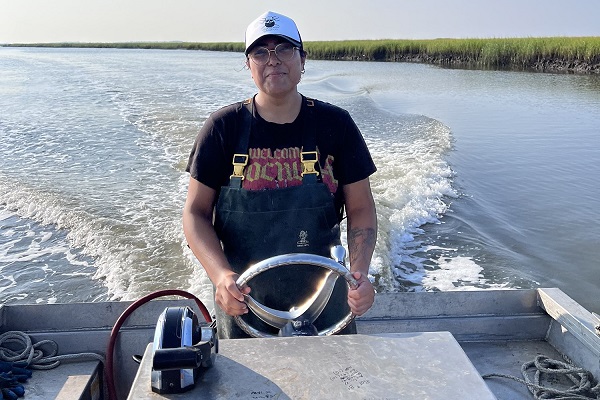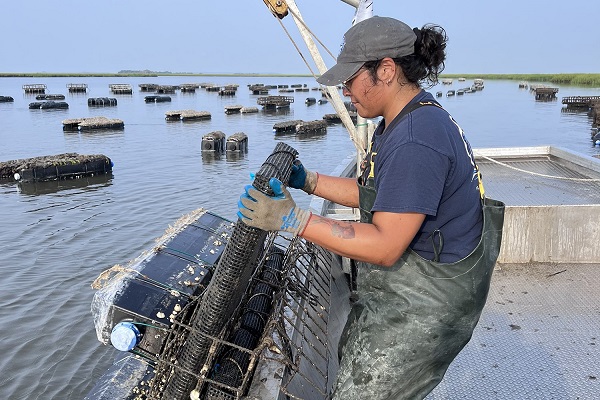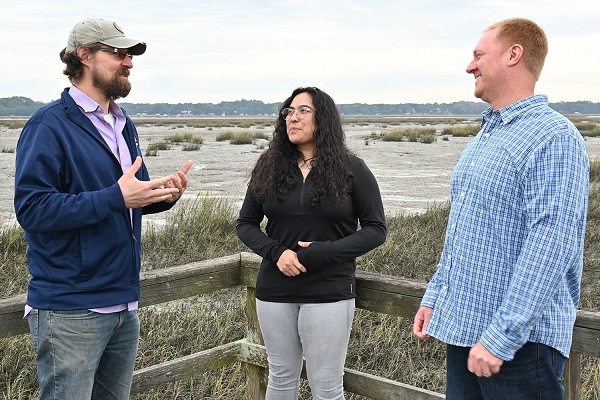Denia Lopez '23 Has Momentum
 Denia Lopez ’23 graduated on December 16 with a bachelor’s degree in biology and a
concentration in coastal ecology and conservation.
Denia Lopez ’23 graduated on December 16 with a bachelor’s degree in biology and a
concentration in coastal ecology and conservation.Denia Lopez does not want to lose momentum.
A first-generation college student, Lopez graduated in December with a bachelor’s degree in biology and a concentration in coastal ecology and conservation.
She is ready for the next exciting phase of her life. A phase she is prepared for because of career-building opportunities she had at USCB.
"I’ve conducted research with professors, I’ve gone to conferences, I’ve had internships, and I’ve made connections,” Lopez said.
Her long-term plans include graduate school — she’s applying to the Virginia Institute of Marine Science, among others — but first, she’s joining the Peerside Program at the Florida Institute of Oceanography in St. Petersburg.
The year-long mentorship program, which starts in January, builds community among young professionals in ocean science, technology, engineering, arts, and mathematics. Participants benefit from networking and career-development experiences, including a week working on the research vessel Western Flyer, workshops, and building skills for the New Blue Economy.
It’s just one way Lopez has built a foundation for a career connected to the sea.
Growing up in Beaufort County, never far from the May River estuary, sparked Lopez’s passion for the ocean.
"I’ve always been interested in marine science, being raised here on the coast and in the Lowcountry,” she said. “It’s so biodiverse and you have an estuary and the ocean. It’s just beautiful.”
When considering college, Lopez said she had first to decide what career path she wanted to pursue. Music — the cello — was the runner-up. Then she enrolled in USC Columbia but found it too big.
"My classes were 200-plus students, and I did not like that,” she explains. “It was harder to get involved.”
That’s when USCB’s biology program attracted Lopez’s interest, as did the university’s size and proximity to her home and family. She also found the opportunity she was looking for to get involved with her major, even before classes started.
"I came across the name Dr. Mercer Brugler and sent him an email,” Lopez said. “I asked him if he had any room in his lab for another research assistant, and that I don't have much experience but I'm a new student coming in, and I'd love to chat with him. He responded to me really fast!”
Brugler, an associate professor of Marine Biology, and Lopez set up a meeting and shortly thereafter, he offered her a position as a research assistant in his lab.
"Honestly, that was the start of everything,” Lopez said.
Lopez began working with Brugler on collecting environmental DNA samples in local seawater to get a better idea of what species were living in the ecosystem.
Recently, she and Brugler used eDNA techniques to study oyster reef ecology in Georgetown, South Carolina, through USC’s Belle W. Baruch Institute for Marine and Coastal Sciences.
In summer 2022, another career-building opportunity took Lopez to the Mote Marine Laboratory and Aquarium in Sarasota, Florida. Brugler encouraged her to apply for the two-month internship and wrote her a recommendation letter. Lopez was accepted into the benthic ecology program, researching the seabed.
"I studied water quality, invertebrates, and harmful red algae blooms that affect the coast,” Lopez said. “It definitely impacted my life. I got to network with a lot of people. I've met some of my best friends through it, and I have connections because of that.”
Last summer, Lopez had yet another engaging internship, this time in a different field of coastal ecology — aquaculture.
"It opened my eyes to different paths and avenues within marine science,” she said. “It’s like a whole different realm of marine science that I didn't know I'd be interested in, whatsoever.”
 Denia Lopez checking on an oyster cage.
Denia Lopez checking on an oyster cage.That internship program is Minorities in Aquaculture and it’s operated in partnership with the South Carolina Sea Grant Consortium. Brugler helped Lopez apply for it and she spent three months in the summer working with the biggest oyster farm in South Carolina, Lowcountry Oyster Company in Greenpond near the ACE Basin.
"I was out on the water every single day with those oysters, getting to meet the farmers,” Lopez said. “I learned a lot about the business and a lot about farmers. I heard the word ‘sustainability’ thrown around like crazy.”
The experience made such an impact on Lopez that she now thinks she’ll pursue aquaculture in graduate school. Realizations like that are what internships are all about, says Brugler.
"An internship is experiential learning at its best,” he said. “Through internships, seemingly disjunct ideas learned in the classroom are stitched together and a bigger - more exciting - picture of the real world is revealed.”
Lopez’s biology internships were in the summer (fortunately they were paid, she says), but during the school year, she continued developing her lab skills — and her resume — as a research assistant.
In addition to working with Brugler when she first arrived on campus, Lopez spent two semesters in the lab with Dr. Daniel “Tye” Pettay, assistant professor of Biological Oceanography. They researched algae, chlorophyll, primary production (photosynthesis), and water quality.
 Professors Mercer Brugler (left) and Tye Pettay with Denia Lopez on a dock near USCB’s
campus in Beaufort.
Professors Mercer Brugler (left) and Tye Pettay with Denia Lopez on a dock near USCB’s
campus in Beaufort.Looking back on her USCB experience, Lopez really appreciates the mentorship and support she received from her professors, especially Brugler and Pettay.
"I was definitely helped,” she said, “it was so motivating and encouraging. Having support from faculty is so important and it really makes the student feel like they are not alone.”
Now that her undergraduate years are behind her, Lopez has some advice for students.
"Don’t be afraid to reach out. You have to network; you have to look for outside opportunities. It's imperative for your career, “ she said. “You can't just spend all your summers and semesters working on campus in a lab. Network and look for outside opportunities, no matter how nerve-wracking it is.”
-USCB-
JJ/12/19/23